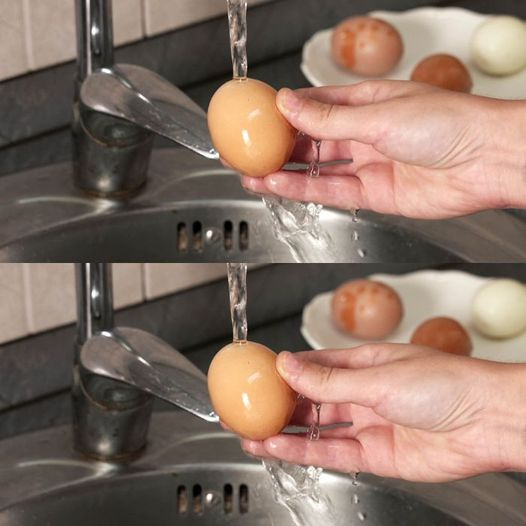ADVERTISEMENT
Eggs are a staple in many American kitchens, versatile enough to be enjoyed poached, fried, scrambled, or baked. But did you know that washing eggs before using them might be a habit you need to break? While it may seem logical to rinse off any dirt or residue from the shell, doing so can actually compromise the quality and safety of the eggs you’re preparing. In this post, we’ll explore why you should skip washing, how to properly store eggs, and tips for ensuring they stay fresh and safe for your family.
Ingredients and Equipment Needed
Before diving into the details, let’s clarify what you need to consider when using and storing eggs:
Key Considerations:
- Fresh Eggs: Choose eggs that are as fresh as possible. Look for a clean shell without cracks.
- Non-Detergent Cleaning Tools: Use a soft brush or a rough sponge if you need to remove dirt without water.
- Storage Containers: A carton or an egg holder for proper storage.
Why You Shouldn’t Rinse Eggs
When it comes to handling eggs, one of the most surprising things you can do is to not wash them. Here’s why:
- Natural Protective Layer: Fresh eggs come with a protective coating known as the cuticle. This layer keeps out bacteria and other harmful microbes. Washing removes this natural barrier, making the eggs more susceptible to contamination.
- Bacterial Growth: The shell of an egg is porous, meaning it can absorb moisture and bacteria. When you rinse an egg, you could inadvertently push contaminants through the shell and into the egg, potentially leading to foodborne illnesses like salmonella.
- Storage Recommendations: Eggs should ideally be stored at room temperature, especially if they haven’t been pre-washed. Refrigerating unwashed eggs can lead to condensation, which may foster bacteria on the shell.
Step-by-Step Preparation Guide
Here’s how to handle eggs safely and effectively without washing:
- Check for Cleanliness: Inspect the eggs for any visible dirt. If you see dirt but no cracks, you can use a soft brush or the rough side of a sponge to gently remove it without water.
- Store Properly: If you choose to refrigerate eggs, make sure they are pointed down to protect the yolk. Avoid placing them in the door; instead, keep them on the bottom shelf to maintain a consistent temperature.
- Avoid Odor Absorption: To keep your eggs from absorbing odors, store them away from strong-smelling foods like cheese and onions. Keeping them in their original carton helps minimize this risk.
Optional Variations and Creative Additions
While we’re focusing on how to handle and store eggs, it’s also essential to consider how to use them creatively:
- Different Cooking Methods: Experiment with various cooking methods like poaching for a delicate dish, or baking for hearty casseroles. Each method brings out unique flavors.
- Egg-Based Dishes: Incorporate eggs into dishes like quiches, frittatas, or breakfast burritos. They can add protein and richness to any meal.
- Use of Egg Whites: If you’re looking for a lighter option, consider using egg whites for scrambles or as a binding agent in recipes.
Serving Tips
To ensure your eggs shine at the table, consider these serving tips:
- Presentation Matters: Serve eggs on a colorful plate or in a stylish dish to make them more appealing. A sprinkle of fresh herbs can elevate the presentation.
- Pair with Sides: Pair your eggs with fresh vegetables, whole grain toast, or a light salad to create a balanced meal.
- Serve Warm: Eggs taste best when served warm, so aim to cook them right before mealtime for optimal flavor and texture.
FAQs for Best Preparation and Storage Practices
1. Should I wash eggs before cracking them?
No, it’s best to avoid washing eggs before use. Instead, gently brush off any dirt with a dry cloth or sponge.
2. How long can I store eggs at room temperature?
Unwashed eggs can typically be stored at room temperature for about 2-3 weeks. However, if they’ve been washed, refrigerate them for safety.
3. Can I freeze eggs?
Yes! You can freeze eggs by scrambling them first or separating the yolks from the whites. Store in airtight containers or freezer bags.
4. What’s the best way to check for freshness?
To check if an egg is fresh, place it in a bowl of water. Fresh eggs will sink, while older eggs will float. This is due to the air pocket that forms inside the egg as it ages.
Conclusion
Understanding how to properly handle and store eggs can greatly enhance your cooking experience and ensure food safety for you and your family. By skipping the wash and using a soft brush for any surface dirt, you protect the natural coating that keeps your eggs safe from bacteria. With these simple tips, you can enjoy delicious egg-based meals with confidence. Embrace this easy-to-follow guide, and your eggs will always be ready for any dish you desire!
